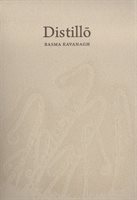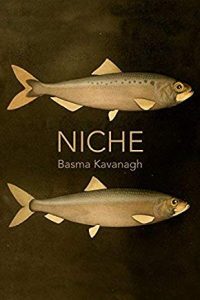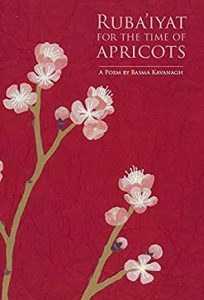
Poetry
Distillō: Poems
Kentville, NS: Gaspereau Press, 2012.
PS8621 .A715 D57 2012
Publisher’s Synopsis (from its website)
In her debut collection, Basma Kavanagh engages the natural world and seeks to explore our relationship to it. Hers is a poetics of description which subverts scientific observation and the authoritative language of nomenclature for mythopoetic ends. In the opening section (“Moisture”), precipitation is dissected and categorized, but ultimately the deluge of “rain making rain, /making rain” overwhelms controlled interrogation and undulating imagery saturates everything. Nomenclature reappears elsewhere in the book, attempting to anchor object poems about west-coast flora and fauna—salmon, elk, bear, bigleaf maple, bog myrtle—which otherwise drift toward the mythworld and gesture in the direction of the ethereal and the totemic. Understanding that language can be most precise when it harbours ambiguity and surprise, Kavanagh experiments with pattern poems and the layering of multiple voices in her attempt to express “a fullness /an absence /of self.” This is a book which turns over rocks and looks under them in search of truth in its soft, damp hiding places, poems which instruct us to “[d]escend. Blend /your knowing with the breath of earth”.

Poetry
Niche
Calgary: Frontenac House Poetry, 2015.
PS8621 .A715 N53 2015
Publisher’s Synopsis (from its website)
Compelled by loss of knowledge, species, habitat and traditions, my intention with this collection is to elucidate the endurance of what is no longer physically apparent. Extinctions and an exploration of the Red List (the endangered species list for Nova Scotia) are important to this work. The poems grapple with human culpability, but also ask: What will happen as human relationships with non-human animals and other living things diminish? What will happen if we become extinct? These larger questions about our future in a changing climate are inextricably linked to specific inquiries into what we have lost by reducing certain habitats, hunting particular species to the brink of extinction, and abandoning place-specific traditions and practices. Our sadness surrounding extinction seems to confirm E. O. Wilson’s Biophilia (life-loving) hypothesis, our basic need for other life; however, a uniquely human self-loathing distances us from the very life-affirming and life-giving connections that we require. How do we move beyond despair? What happens after extinction? What is regained through the revival of traditions, the restoration of habitats, re-introductions of species? Is this a moment to be both patient and visionary, to see beyond destruction to whatever natural renewal will occur without more intervention, or should we cautiously explore the “re-animations” and “de-extinctions” proposed by the scientific community?
Awards and Honours
2016 Lansdowne Prize for Poetry — Manitoba Book Awards (Winner)
2016 Alberta Book Publishers Awards: Cover Design (Finalist)
2016 Alberta Book Publishers Awards: Robert Kroetsch Award for Poetry (Finalist)

Poetry
Ruba’iyat for the Time of Apricots: A Poem
Calgary: Frontenac House Poetry, 2018
PS8621 .A715 R83 2018
Publisher’s Synopsis
This book length poem comprises three major interwoven threads: Ahli, an auto/biographical thread about my Lebanese heritage; Astura, a grim tale linking climate change and the oppression of women, and Ana, a reflection on identity, language, and writing. To tell a story of my mother, her sisters, and their mother; a story of traditions, gesture, ritual, transformation, and self, is to persist against the erasure of the nuanced and tenacious feminine histories that co-exist with our troubled present and its bland stereotypes.
Like a seed, a family story houses its ancestors, and the diversity—genetic and experiential—that equips us to thrive in a multitude of possible futures. Written in quatrains, called ruba’iyat in Arabic, from the word for “four”, each stanza of this poem is self-contained, yet converses with adjacent stanzas to build a narrative. The repetition of phrases across stanzas, and the studding of the text with Arabic words, combine to create a layered, incantatory quality evoking the complexity of Arabic oral poetry.